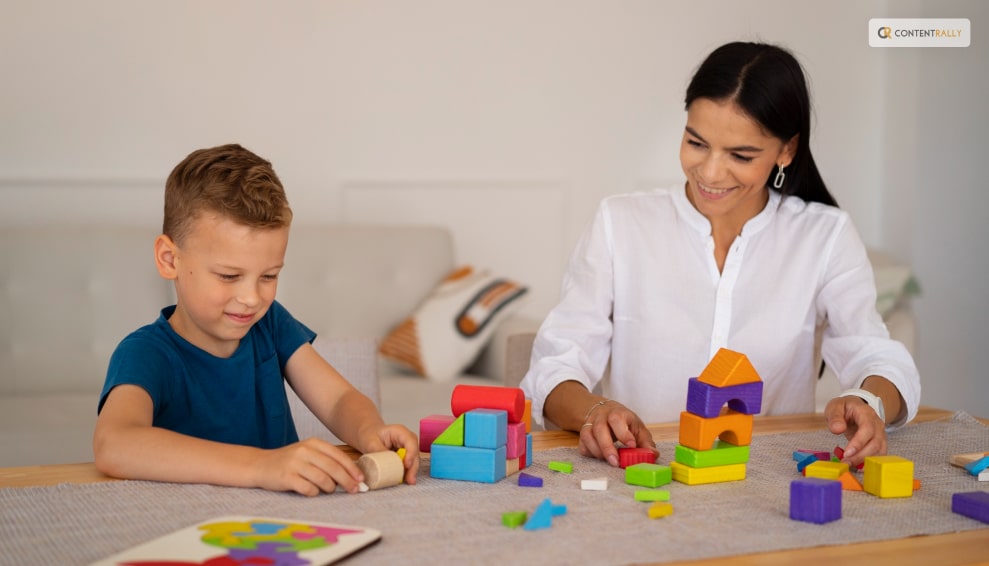If there is one thing that all new mothers search for, it is related to “how to be a good mother?” In case you have recently embraced motherhood, the heartiest congratulations to you!
Motherhood is a journey like no other, filled with love, laughter, and its fair share of challenges. Whether you’re a first-time mom or a seasoned pro, we’re here to provide you with simple, practical advice in a warm and welcoming tone.
In the ever-changing landscape of parenthood, our aim is to offer valuable insights and tips that empower you to be the best mom you can be. From self-care to nurturing your child’s growth, we’ll explore the essentials of modern motherhood with clarity and compassion. Join me on this beautiful adventure of raising happy, healthy, and confident children while cherishing every moment along the way. Keep on reading this blog till the end to learn more about the same…
How To Be A Good Mother In Modern Times?

Motherhood is an incredible journey filled with joy, challenges, and endless love. Whether you’re a new mom or a seasoned pro, there’s always room for growth and learning in the art of being a great mom. In this fast-paced world, finding balance and being the best mom you can be can feel like a daunting task. But fear not, I have some simple yet powerful tips to help you navigate this incredible journey with style and grace.
1. Prioritize Self-Care

Amid the whirlwind of motherhood, don’t forget to put yourself on the priority list. Taking care of your well-being is not a luxury; it’s a necessity. Think of it as putting on your oxygen mask first before assisting others. Here’s how to make self-care a non-negotiable part of your routine.
Firstly, schedule it. Just like you block out time for meetings and appointments, carve out time for self-care activities. Whether it’s a daily 15-minute meditation session or a weekly yoga class, planning ensures you won’t overlook it.
Secondly, seek support. Enlist the help of a trusted friend or family member to watch your child while you recharge. Don’t hesitate to lean on your support network; they’re there to help.
Thirdly, explore self-care options. Self-care isn’t one-size-fits-all. It could be reading a book, taking a long bath, going for a walk, or pursuing a hobby you love. Discover what rejuvenates your spirit and makes you feel like your best self.
Lastly, banish guilt. Remember that taking care of yourself doesn’t make you a selfish mom. It makes you a better person. When you’re rested and content, you can give your child the love and attention they deserve.
Prioritizing self-care isn’t a luxury; it’s a necessity that ensures you can continue to be the wonderful mom your child needs.
2. Embrace Imperfection

Certainly, embracing imperfection in motherhood is a crucial aspect of being a great mom. It means letting go of the unrealistic expectation of perfection and understanding that it’s okay to make mistakes. Here’s why this concept is so essential:
In the beautiful chaos of raising children, there will be moments of spilled milk, missed bedtimes, and tears. Embracing imperfection means recognizing that these hiccups are a natural part of the journey. Instead of dwelling on these small missteps, focus on the bigger picture – the love and connection you share with your child.
By accepting that you’re not flawless, you create an environment where your child can also learn that making mistakes is part of life. They observe how you handle setbacks with resilience and grace, which is a valuable lesson in itself.
Moreover, striving for perfection can lead to burnout and unnecessary stress. Embracing imperfection allows you to prioritize your well-being and mental health. It encourages self-compassion and self-forgiveness, which ultimately makes you a happier and more relaxed mom.
So, in this journey of motherhood, remember that it’s the imperfect moments that often hold the most beauty and authenticity. They’re the threads that weave the rich tapestry of your family’s story. Embrace them, learn from them, and cherish them as part of the unique adventure of being a mom.
3. Listen And Communicate

This is a pivotal aspect of knowing how to be a good mother. It involves creating an environment where open and honest communication with your child is encouraged.
Firstly, it’s essential to be a good listener. When your child speaks, give them your full attention. Make eye contact, and show genuine interest in what they’re saying. This not only makes them feel valued but also helps you understand their needs and emotions better.
Equally important is encouraging your child to express themselves. Foster a safe space where they feel comfortable sharing their thoughts, fears, and dreams. Encourage questions and curiosity. Let them know it’s okay to make mistakes and that they can always come to you for guidance.
Communication is a two-way street. Share your own experiences and wisdom with your child. This not only provides valuable life lessons but also strengthens your bond.
In essence, “Listen and Communicate” is about building trust, empathy, and a strong parent-child relationship. It sets the foundation for effective problem-solving and emotional growth, ensuring that your child feels heard and understood as they navigate the world.
4. Set Boundaries With Love

Setting boundaries with love is a fundamental aspect of effective parenting. It means establishing clear rules and expectations for your child’s behavior while maintaining a loving and nurturing environment.
To implement this, start by explaining the reasons behind the rules to your child. When they understand why certain boundaries are in place, they are more likely to cooperate. Be consistent in enforcing these boundaries so that your child knows what to expect.
It’s important to use positive reinforcement when your child follows the rules. Praise and reward their good behavior to reinforce the idea that adhering to boundaries leads to positive outcomes.
Equally vital is addressing rule-breaking with love and patience. Instead of reacting with anger, take the opportunity to teach and guide. Explain the consequences of their actions and encourage them to make better choices next time.
Setting boundaries with love fosters a sense of security and trust in your child. They’ll know that your rules are not arbitrary but come from a place of care and concern. Ultimately, it helps your child develop self-discipline and a strong moral compass, setting them up for success in life.
Incorporating love into your boundary-setting approach creates a harmonious balance between structure and affection, promoting a healthy parent-child relationship.
5. Be Present

In the whirlwind of modern life, where smartphones buzz with notifications and to-do lists seem never-ending, the art of being present with your child is a precious gift. Being present means more than just physically being in the same room; it’s about giving your child your undivided attention, creating moments of genuine connection, and building memories together.
When you’re present, you set aside distractions and focus on your child’s world. This means putting away your phone, turning off the TV, and actively engaging in activities that matter to them. Whether it’s playing with building blocks, reading a story, or having a heart-to-heart conversation, being present fosters a sense of security and love in your child’s heart.
Children are incredibly perceptive. They can tell when you’re fully engaged and when your mind is elsewhere. Being present assures your child that they are important, valued, and cherished. It strengthens the bond between you and opens the door for meaningful conversations, questions, and shared laughter.
In a world that constantly competes for your attention, being present with your child is a deliberate choice that pays off in the form of a stronger connection and a lifetime of cherished memories. So, slow down, savor the little moments, and be there for your child, for those are the moments that truly matter.
6. Foster Independence

Encouraging independence in your child is a vital aspect of effective parenting, especially in the journey of knowing how to be a good mother. By fostering independence, you empower your child to develop crucial life skills and self-confidence.
Start by allowing them age-appropriate responsibilities. For younger children, this could mean picking out their clothes or setting the table. As they grow, gradually give them more autonomy in decision-making. Whether it’s choosing extracurricular activities or managing their allowance, these experiences teach them responsibility and accountability.
Let them explore their interests and passions. Support their curiosity by providing resources and opportunities for learning. Whether it’s enrolling them in art classes or letting them try their hand at a new sport, this freedom to explore nurtures their unique talents.
Encourage problem-solving. When they encounter challenges, refrain from immediately providing solutions. Instead, guide them in finding answers independently. This helps build their problem-solving skills and resilience.
Celebrate their achievements, no matter how small. Acknowledge their efforts and growth, reinforcing their self-worth and motivation to continue learning and growing.
By fostering independence, you equip your child with the skills and mindset necessary to thrive in an ever-changing world while instilling the confidence to face life’s challenges head-on.
7. Nurture Their Passions

Nurturing your child’s passions is a beautiful journey within the journey of motherhood. It’s about recognizing and supporting what makes your child’s heart sing. Here’s how to do it in a way that’s simple and fun.
First, observe your child closely. Pay attention to what activities light up their eyes, where their curiosity leads them, and what hobbies they naturally gravitate toward. It could be drawing, dancing, playing soccer, or collecting bugs – the possibilities are endless.
Once you’ve identified their interests, provide the tools and opportunities for them to explore further. If it’s art, stock up on paints, paper, and brushes. If it’s soccer, enroll them in a local league. The key is to create an environment where they can delve deeper into their passion.
Encourage practice and perseverance. Passion often comes with frustration, but remind your child that improvement takes time and effort. Share stories of famous artists, athletes, or musicians who faced challenges but persevered.
Celebrate their achievements, no matter how small. Display their artwork, attend their games, or host a mini-concert at home. These gestures boost their confidence and show that you’re their biggest cheerleader.
Lastly, be patient and adaptable. Passions can change, and that’s perfectly fine. The goal is to provide a nurturing space where they feel encouraged to explore their interests, grow, and ultimately, find their true passions in life.
8. Teach Empathy And Kindness

Teaching empathy and kindness to your child is like planting seeds of compassion that will blossom throughout their life. It’s about nurturing their ability to understand and care for others. Here’s how you can do it to be a good mother:
1. Lead By Example: Children learn by observing. Demonstrate empathy and kindness in your own actions. Show them how to be considerate and respectful to everyone, from family members to strangers.
2. Read And Discuss: Choose books that emphasize empathy and kindness. After reading, engage your child in discussions about the characters’ feelings and actions. This helps them relate to the importance of these values.
3. Encourage Perspective-Taking: Ask your child questions like, “How do you think they feel?” or “What would you do in their shoes?” This encourages them to think from others’ viewpoints, fostering empathy.
4. Acknowledge Feelings: When your child experiences emotions, whether positive or negative, acknowledge them. Say, “I understand you’re feeling sad. How can we make it better?” This validates their feelings and teaches empathy.
5. Practice Gratitude: Encourage your child to express gratitude for the kindness they receive. This fosters an appreciation for the good in the world.
6. Teach Conflict Resolution: Show your child how to resolve conflicts peacefully and with empathy. Teach them to listen and find solutions that consider everyone’s feelings.
7. Celebrate Acts Of Kindness: When your child demonstrates kindness, no matter how small, celebrate it. Praise their actions and explain why it matters.
By instilling empathy and kindness in your child’s heart, you’re not only shaping them into compassionate individuals but also contributing to a more caring and understanding world. These values will guide them as they navigate relationships and make a positive impact on society.
9. Find A Support System

In the rollercoaster ride of motherhood, finding a support system can be a game-changer. It’s like having a safety net beneath you as you navigate the twists and turns of parenthood.
As a mom, you might encounter challenges, doubts, and moments of exhaustion. That’s where your support system comes in. It can be composed of fellow moms, friends, family members, or even online communities. These are the people who understand what you’re going through because they’ve been there too.
Seeking out local parenting groups or joining online forums can be a great start. These spaces offer a platform to share your experiences, seek advice, and receive emotional support. It’s a place to vent when you’re overwhelmed and to celebrate your parenting victories with those who truly get it.
Your support system can provide valuable insights, lend a helping hand, or simply offer a listening ear when you need it most. Remember, you don’t have to go through motherhood alone. Embrace the camaraderie of your support system, and together, you can weather the storms and cherish the sunny moments of this incredible journey.
Finding a support system in the world of motherhood is about building a network of understanding and empathetic individuals who can make the joys sweeter and the challenges more manageable.
10. Learn To Let Go

Learning to let go is a pivotal aspect of parenting, as your child evolves into an independent individual. It involves loosening the reins, allowing them room to make their own choices, even if those choices occasionally lead to missteps.
As a parent, you’ve nurtured, guided, and protected your child since their first breath. However, there comes a time when they need the freedom to explore and learn from their experiences. It’s about trusting that the values and life skills you’ve instilled in them will serve as a reliable compass.
This process requires a delicate balance of support and space. It means giving them responsibility, whether it’s managing their own schedule, handling minor conflicts, or making decisions about their interests and friendships. When you let go, you empower them to grow into confident, responsible adults.
While it can be challenging to watch them face challenges and setbacks, remember that these are opportunities for growth. Mistakes are valuable lessons that contribute to their development. Your role evolves from protector to mentor, offering guidance and a safe harbor when they need it most.
Wrapping It Up!
Being a good mother is not about perfection but about love, patience, and the willingness to grow alongside your child. Embrace the journey, relish the moments, and know that your dedication and love are shaping a bright future for your little one. In the end, it’s the simple, heartfelt gestures that make you a truly great mom. So, go ahead and enjoy the magic of motherhood – you’ve got this!
In case you want to know about how to be a good mother, I hope that this blog has been of help to you. If there are any other queries related to the same, feel free to let me know. All that you need to do is scroll down till you reach the bottom of the page. Then leave your comments and queries in the box below. And I will be there to answer them all for you!
Keep Reading Things:
- 10 Effective Homework Tips for Your Kids
- Practical Ways To Help Your Elderly Parents
- Become A Foster Parent – Make An Impact On The Community























